Factors Influencing Motivation: A Report on Employee Experiences
VerifiedAdded on 2023/06/18
|9
|2135
|296
Report
AI Summary
This project report provides a comprehensive analysis of the various factors that motivate individuals in the workplace, extending beyond mere monetary compensation to include skill development, knowledge enhancement, and increased autonomy. It delves into Maslow's Hierarchy of Needs, highlighting the importance of fulfilling physiological, safety, love and belongingness, esteem, and self-actualization needs to foster motivation. The report distinguishes between extrinsic and intrinsic motivation, emphasizing the significance of salary, promotion opportunities, and a positive work environment. Furthermore, it examines positive factors such as good colleague relationships, learning and career development prospects, and job security, alongside negative factors like workplace conflict, a negative working environment, and poor management. Finally, it proposes strategies for mitigating the impact of these negative factors, including providing employees with opportunities to express their opinions and fostering an environment of trust and respect, all of which contribute to increased job satisfaction and productivity. Desklib offers this report and other resources to aid student learning.
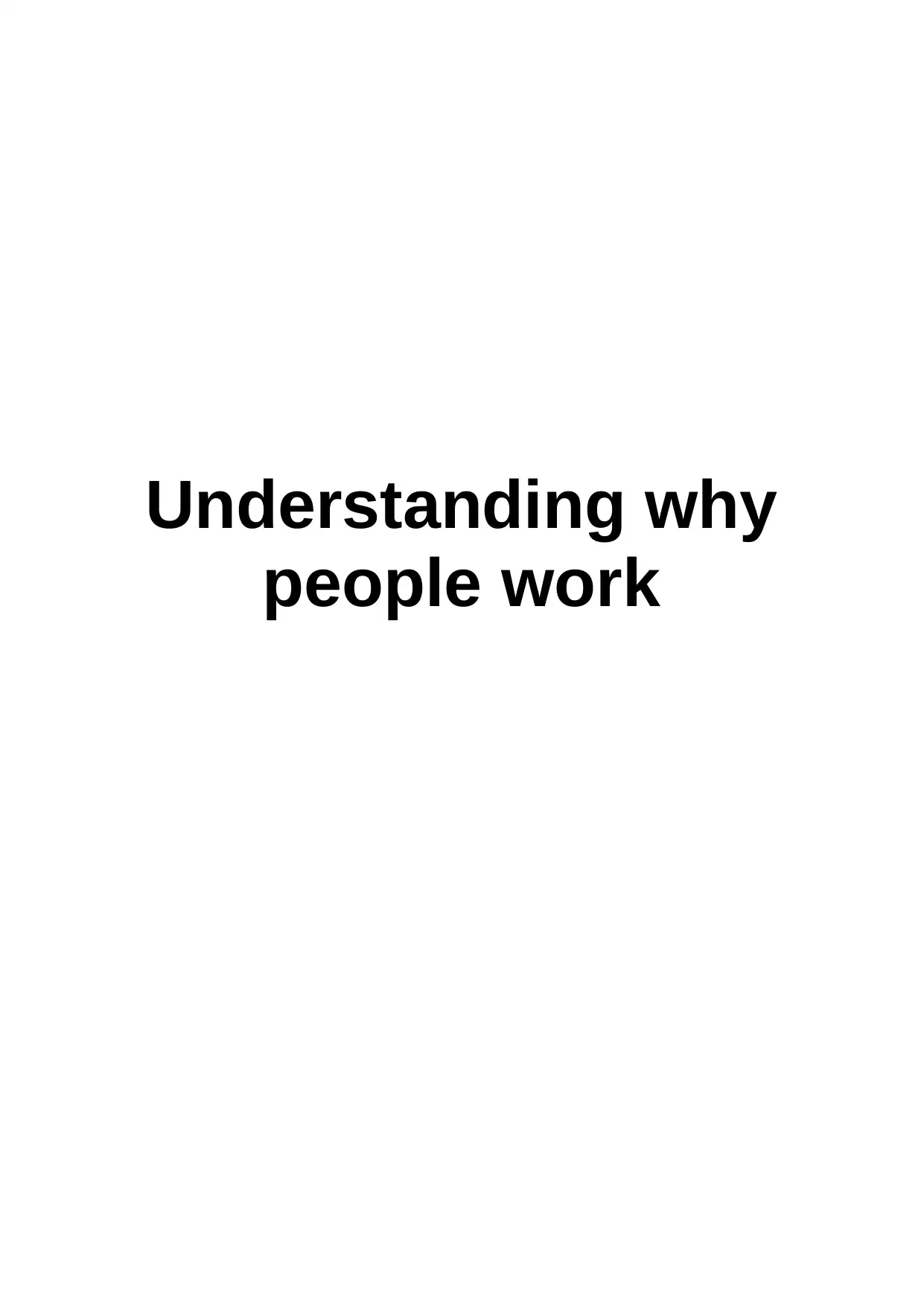
Understanding why
people work
people work
Paraphrase This Document
Need a fresh take? Get an instant paraphrase of this document with our AI Paraphraser
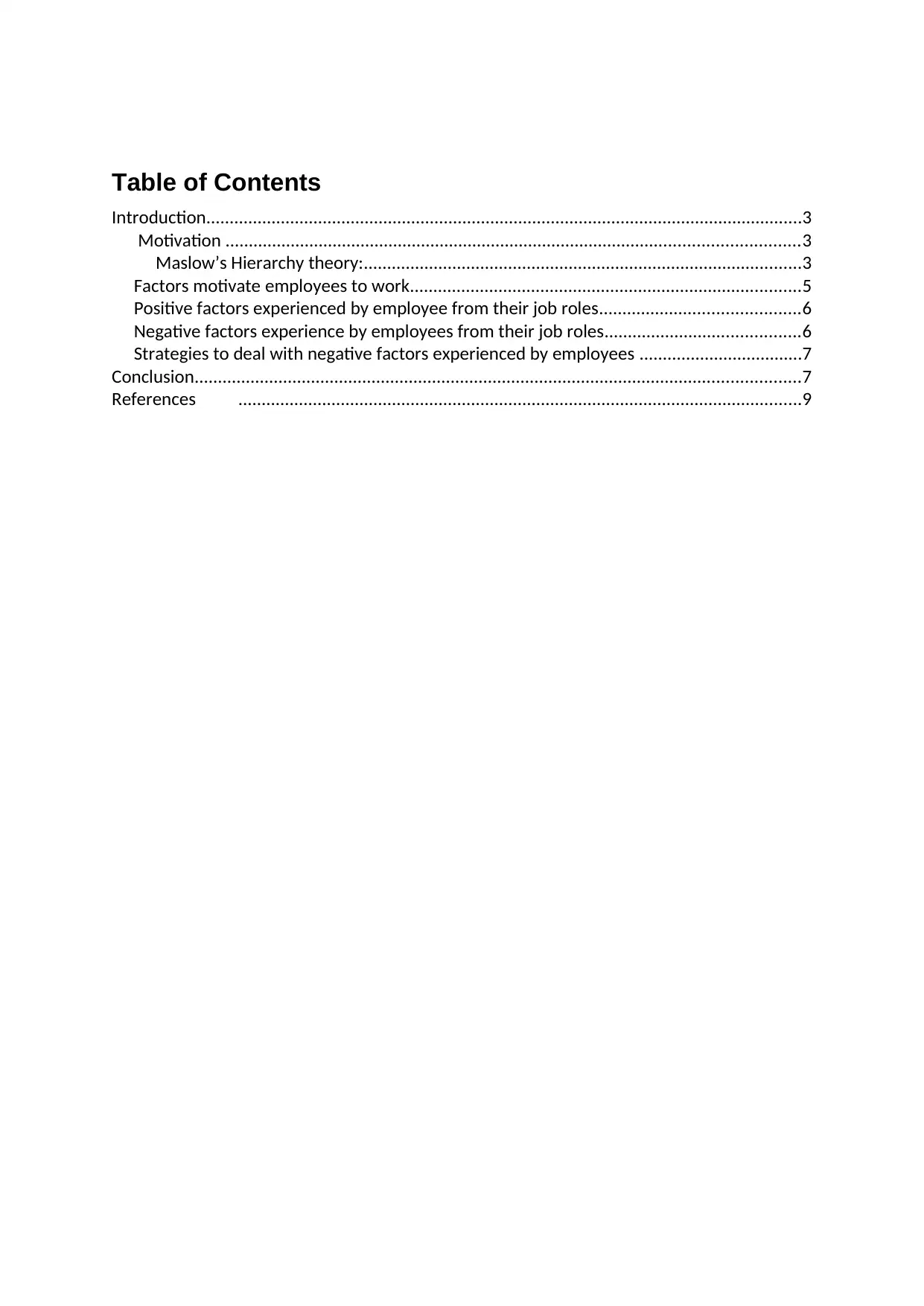
Table of Contents
Introduction................................................................................................................................3
Motivation ...........................................................................................................................3
Maslow’s Hierarchy theory:..............................................................................................3
Factors motivate employees to work....................................................................................5
Positive factors experienced by employee from their job roles...........................................6
Negative factors experience by employees from their job roles..........................................6
Strategies to deal with negative factors experienced by employees ...................................7
Conclusion..................................................................................................................................7
References .........................................................................................................................9
Introduction................................................................................................................................3
Motivation ...........................................................................................................................3
Maslow’s Hierarchy theory:..............................................................................................3
Factors motivate employees to work....................................................................................5
Positive factors experienced by employee from their job roles...........................................6
Negative factors experience by employees from their job roles..........................................6
Strategies to deal with negative factors experienced by employees ...................................7
Conclusion..................................................................................................................................7
References .........................................................................................................................9
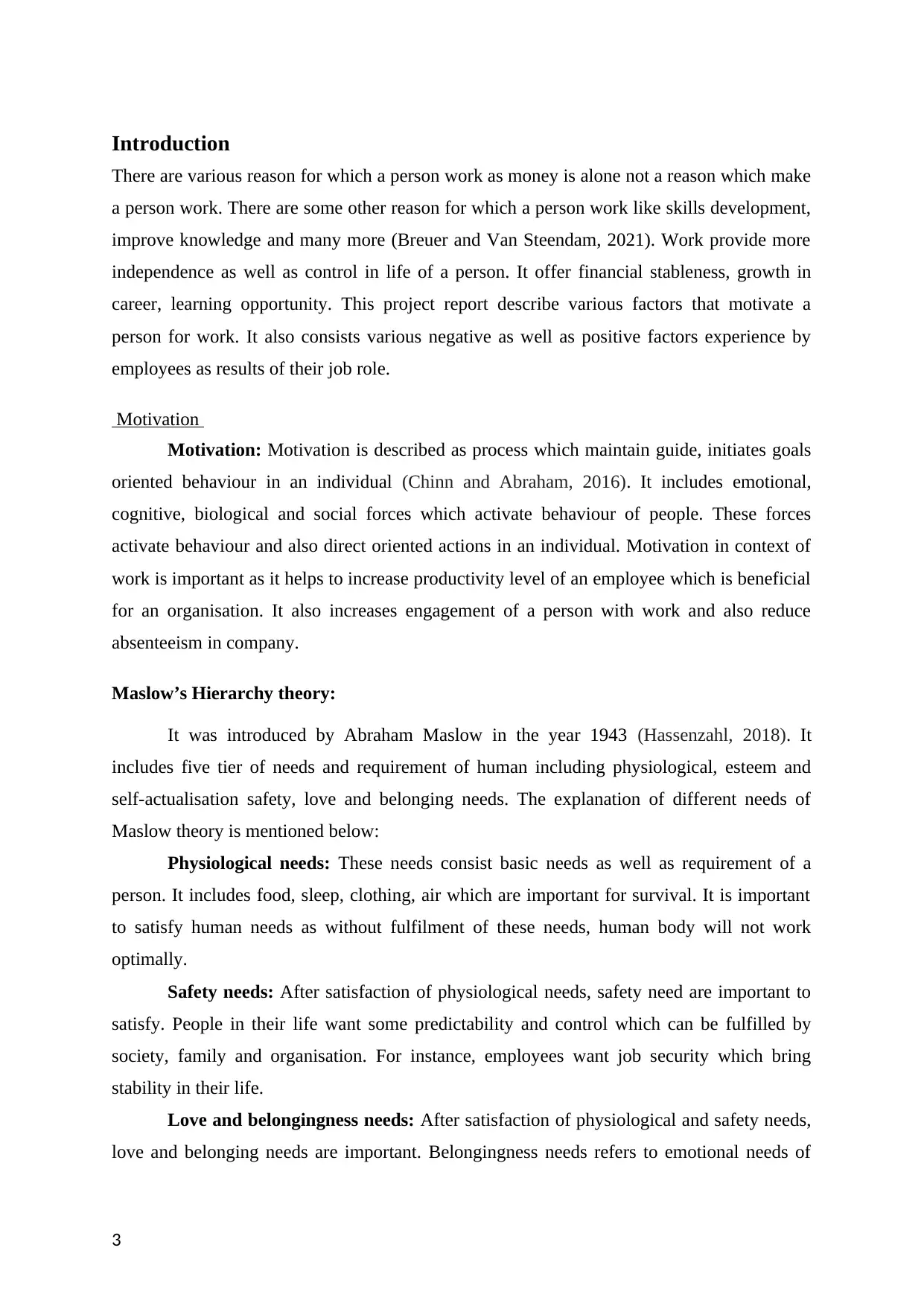
Introduction
There are various reason for which a person work as money is alone not a reason which make
a person work. There are some other reason for which a person work like skills development,
improve knowledge and many more (Breuer and Van Steendam, 2021). Work provide more
independence as well as control in life of a person. It offer financial stableness, growth in
career, learning opportunity. This project report describe various factors that motivate a
person for work. It also consists various negative as well as positive factors experience by
employees as results of their job role.
Motivation
Motivation: Motivation is described as process which maintain guide, initiates goals
oriented behaviour in an individual (Chinn and Abraham, 2016). It includes emotional,
cognitive, biological and social forces which activate behaviour of people. These forces
activate behaviour and also direct oriented actions in an individual. Motivation in context of
work is important as it helps to increase productivity level of an employee which is beneficial
for an organisation. It also increases engagement of a person with work and also reduce
absenteeism in company.
Maslow’s Hierarchy theory:
It was introduced by Abraham Maslow in the year 1943 (Hassenzahl, 2018). It
includes five tier of needs and requirement of human including physiological, esteem and
self-actualisation safety, love and belonging needs. The explanation of different needs of
Maslow theory is mentioned below:
Physiological needs: These needs consist basic needs as well as requirement of a
person. It includes food, sleep, clothing, air which are important for survival. It is important
to satisfy human needs as without fulfilment of these needs, human body will not work
optimally.
Safety needs: After satisfaction of physiological needs, safety need are important to
satisfy. People in their life want some predictability and control which can be fulfilled by
society, family and organisation. For instance, employees want job security which bring
stability in their life.
Love and belongingness needs: After satisfaction of physiological and safety needs,
love and belonging needs are important. Belongingness needs refers to emotional needs of
3
There are various reason for which a person work as money is alone not a reason which make
a person work. There are some other reason for which a person work like skills development,
improve knowledge and many more (Breuer and Van Steendam, 2021). Work provide more
independence as well as control in life of a person. It offer financial stableness, growth in
career, learning opportunity. This project report describe various factors that motivate a
person for work. It also consists various negative as well as positive factors experience by
employees as results of their job role.
Motivation
Motivation: Motivation is described as process which maintain guide, initiates goals
oriented behaviour in an individual (Chinn and Abraham, 2016). It includes emotional,
cognitive, biological and social forces which activate behaviour of people. These forces
activate behaviour and also direct oriented actions in an individual. Motivation in context of
work is important as it helps to increase productivity level of an employee which is beneficial
for an organisation. It also increases engagement of a person with work and also reduce
absenteeism in company.
Maslow’s Hierarchy theory:
It was introduced by Abraham Maslow in the year 1943 (Hassenzahl, 2018). It
includes five tier of needs and requirement of human including physiological, esteem and
self-actualisation safety, love and belonging needs. The explanation of different needs of
Maslow theory is mentioned below:
Physiological needs: These needs consist basic needs as well as requirement of a
person. It includes food, sleep, clothing, air which are important for survival. It is important
to satisfy human needs as without fulfilment of these needs, human body will not work
optimally.
Safety needs: After satisfaction of physiological needs, safety need are important to
satisfy. People in their life want some predictability and control which can be fulfilled by
society, family and organisation. For instance, employees want job security which bring
stability in their life.
Love and belongingness needs: After satisfaction of physiological and safety needs,
love and belonging needs are important. Belongingness needs refers to emotional needs of
3
⊘ This is a preview!⊘
Do you want full access?
Subscribe today to unlock all pages.

Trusted by 1+ million students worldwide
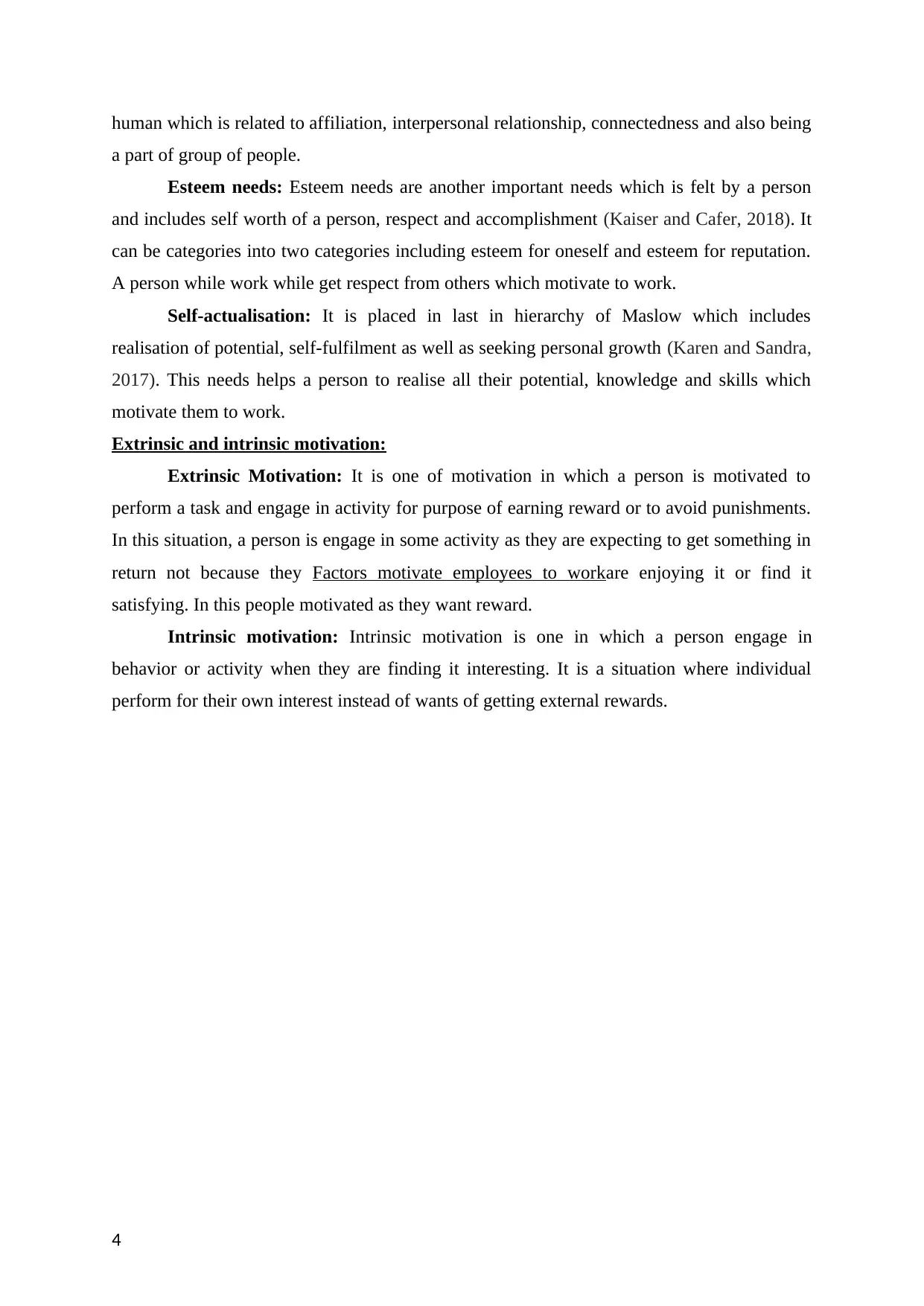
human which is related to affiliation, interpersonal relationship, connectedness and also being
a part of group of people.
Esteem needs: Esteem needs are another important needs which is felt by a person
and includes self worth of a person, respect and accomplishment (Kaiser and Cafer, 2018). It
can be categories into two categories including esteem for oneself and esteem for reputation.
A person while work while get respect from others which motivate to work.
Self-actualisation: It is placed in last in hierarchy of Maslow which includes
realisation of potential, self-fulfilment as well as seeking personal growth (Karen and Sandra,
2017). This needs helps a person to realise all their potential, knowledge and skills which
motivate them to work.
Extrinsic and intrinsic motivation:
Extrinsic Motivation: It is one of motivation in which a person is motivated to
perform a task and engage in activity for purpose of earning reward or to avoid punishments.
In this situation, a person is engage in some activity as they are expecting to get something in
return not because they Factors motivate employees to workare enjoying it or find it
satisfying. In this people motivated as they want reward.
Intrinsic motivation: Intrinsic motivation is one in which a person engage in
behavior or activity when they are finding it interesting. It is a situation where individual
perform for their own interest instead of wants of getting external rewards.
4
a part of group of people.
Esteem needs: Esteem needs are another important needs which is felt by a person
and includes self worth of a person, respect and accomplishment (Kaiser and Cafer, 2018). It
can be categories into two categories including esteem for oneself and esteem for reputation.
A person while work while get respect from others which motivate to work.
Self-actualisation: It is placed in last in hierarchy of Maslow which includes
realisation of potential, self-fulfilment as well as seeking personal growth (Karen and Sandra,
2017). This needs helps a person to realise all their potential, knowledge and skills which
motivate them to work.
Extrinsic and intrinsic motivation:
Extrinsic Motivation: It is one of motivation in which a person is motivated to
perform a task and engage in activity for purpose of earning reward or to avoid punishments.
In this situation, a person is engage in some activity as they are expecting to get something in
return not because they Factors motivate employees to workare enjoying it or find it
satisfying. In this people motivated as they want reward.
Intrinsic motivation: Intrinsic motivation is one in which a person engage in
behavior or activity when they are finding it interesting. It is a situation where individual
perform for their own interest instead of wants of getting external rewards.
4
Paraphrase This Document
Need a fresh take? Get an instant paraphrase of this document with our AI Paraphraser
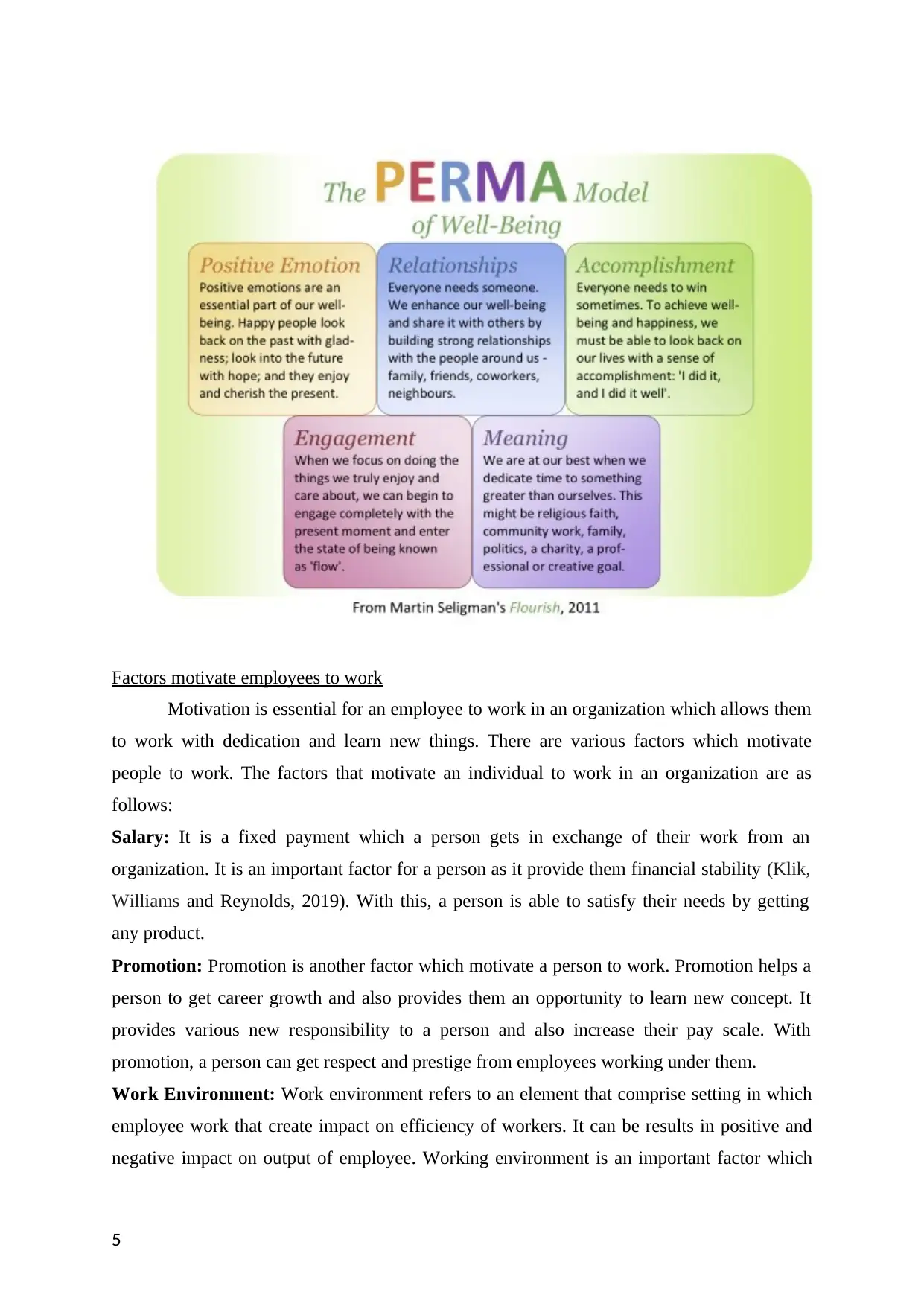
Factors motivate employees to work
Motivation is essential for an employee to work in an organization which allows them
to work with dedication and learn new things. There are various factors which motivate
people to work. The factors that motivate an individual to work in an organization are as
follows:
Salary: It is a fixed payment which a person gets in exchange of their work from an
organization. It is an important factor for a person as it provide them financial stability (Klik,
Williams and Reynolds, 2019). With this, a person is able to satisfy their needs by getting
any product.
Promotion: Promotion is another factor which motivate a person to work. Promotion helps a
person to get career growth and also provides them an opportunity to learn new concept. It
provides various new responsibility to a person and also increase their pay scale. With
promotion, a person can get respect and prestige from employees working under them.
Work Environment: Work environment refers to an element that comprise setting in which
employee work that create impact on efficiency of workers. It can be results in positive and
negative impact on output of employee. Working environment is an important factor which
5
Motivation is essential for an employee to work in an organization which allows them
to work with dedication and learn new things. There are various factors which motivate
people to work. The factors that motivate an individual to work in an organization are as
follows:
Salary: It is a fixed payment which a person gets in exchange of their work from an
organization. It is an important factor for a person as it provide them financial stability (Klik,
Williams and Reynolds, 2019). With this, a person is able to satisfy their needs by getting
any product.
Promotion: Promotion is another factor which motivate a person to work. Promotion helps a
person to get career growth and also provides them an opportunity to learn new concept. It
provides various new responsibility to a person and also increase their pay scale. With
promotion, a person can get respect and prestige from employees working under them.
Work Environment: Work environment refers to an element that comprise setting in which
employee work that create impact on efficiency of workers. It can be results in positive and
negative impact on output of employee. Working environment is an important factor which
5
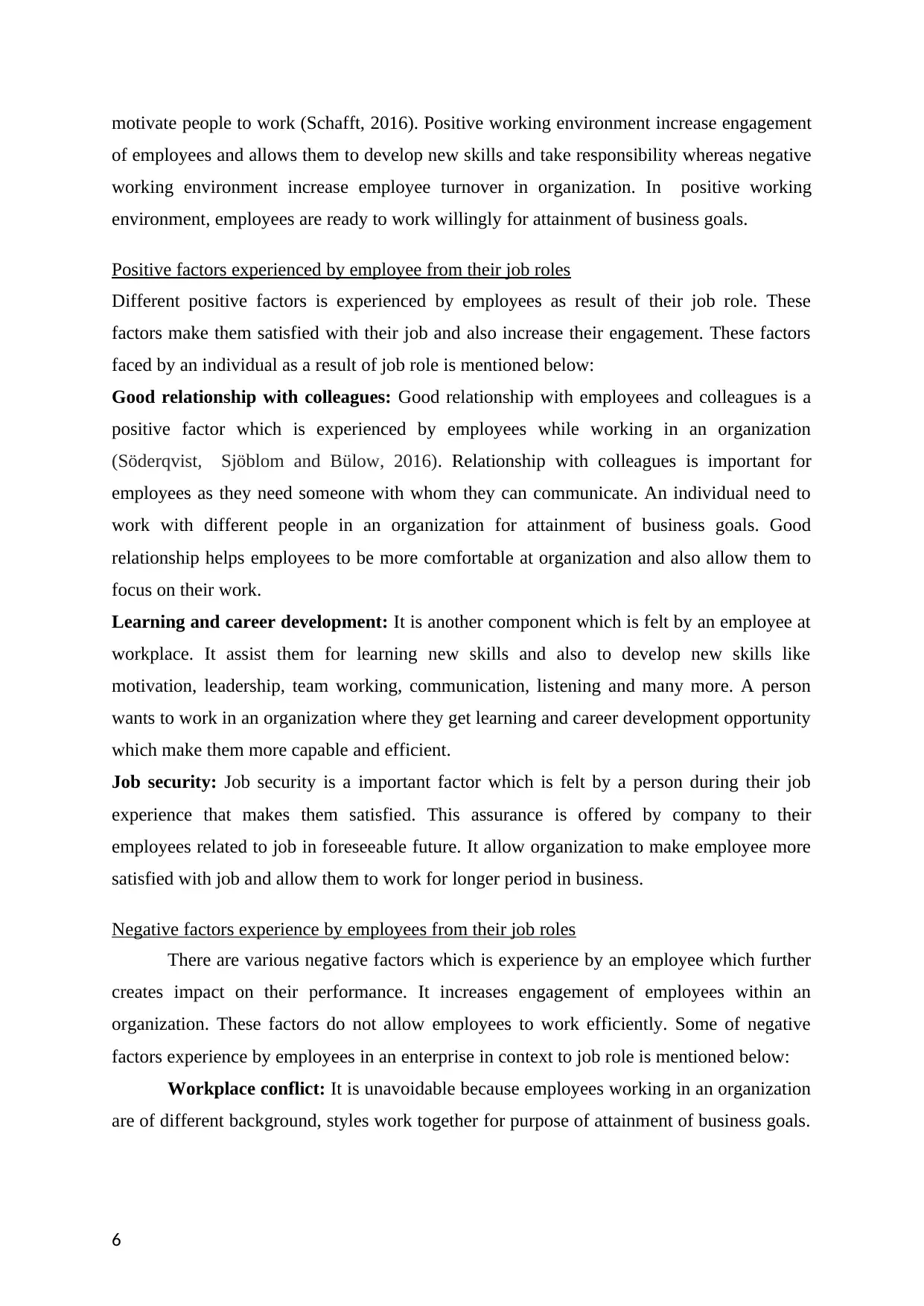
motivate people to work (Schafft, 2016). Positive working environment increase engagement
of employees and allows them to develop new skills and take responsibility whereas negative
working environment increase employee turnover in organization. In positive working
environment, employees are ready to work willingly for attainment of business goals.
Positive factors experienced by employee from their job roles
Different positive factors is experienced by employees as result of their job role. These
factors make them satisfied with their job and also increase their engagement. These factors
faced by an individual as a result of job role is mentioned below:
Good relationship with colleagues: Good relationship with employees and colleagues is a
positive factor which is experienced by employees while working in an organization
(Söderqvist, Sjöblom and Bülow, 2016). Relationship with colleagues is important for
employees as they need someone with whom they can communicate. An individual need to
work with different people in an organization for attainment of business goals. Good
relationship helps employees to be more comfortable at organization and also allow them to
focus on their work.
Learning and career development: It is another component which is felt by an employee at
workplace. It assist them for learning new skills and also to develop new skills like
motivation, leadership, team working, communication, listening and many more. A person
wants to work in an organization where they get learning and career development opportunity
which make them more capable and efficient.
Job security: Job security is a important factor which is felt by a person during their job
experience that makes them satisfied. This assurance is offered by company to their
employees related to job in foreseeable future. It allow organization to make employee more
satisfied with job and allow them to work for longer period in business.
Negative factors experience by employees from their job roles
There are various negative factors which is experience by an employee which further
creates impact on their performance. It increases engagement of employees within an
organization. These factors do not allow employees to work efficiently. Some of negative
factors experience by employees in an enterprise in context to job role is mentioned below:
Workplace conflict: It is unavoidable because employees working in an organization
are of different background, styles work together for purpose of attainment of business goals.
6
of employees and allows them to develop new skills and take responsibility whereas negative
working environment increase employee turnover in organization. In positive working
environment, employees are ready to work willingly for attainment of business goals.
Positive factors experienced by employee from their job roles
Different positive factors is experienced by employees as result of their job role. These
factors make them satisfied with their job and also increase their engagement. These factors
faced by an individual as a result of job role is mentioned below:
Good relationship with colleagues: Good relationship with employees and colleagues is a
positive factor which is experienced by employees while working in an organization
(Söderqvist, Sjöblom and Bülow, 2016). Relationship with colleagues is important for
employees as they need someone with whom they can communicate. An individual need to
work with different people in an organization for attainment of business goals. Good
relationship helps employees to be more comfortable at organization and also allow them to
focus on their work.
Learning and career development: It is another component which is felt by an employee at
workplace. It assist them for learning new skills and also to develop new skills like
motivation, leadership, team working, communication, listening and many more. A person
wants to work in an organization where they get learning and career development opportunity
which make them more capable and efficient.
Job security: Job security is a important factor which is felt by a person during their job
experience that makes them satisfied. This assurance is offered by company to their
employees related to job in foreseeable future. It allow organization to make employee more
satisfied with job and allow them to work for longer period in business.
Negative factors experience by employees from their job roles
There are various negative factors which is experience by an employee which further
creates impact on their performance. It increases engagement of employees within an
organization. These factors do not allow employees to work efficiently. Some of negative
factors experience by employees in an enterprise in context to job role is mentioned below:
Workplace conflict: It is unavoidable because employees working in an organization
are of different background, styles work together for purpose of attainment of business goals.
6
⊘ This is a preview!⊘
Do you want full access?
Subscribe today to unlock all pages.

Trusted by 1+ million students worldwide
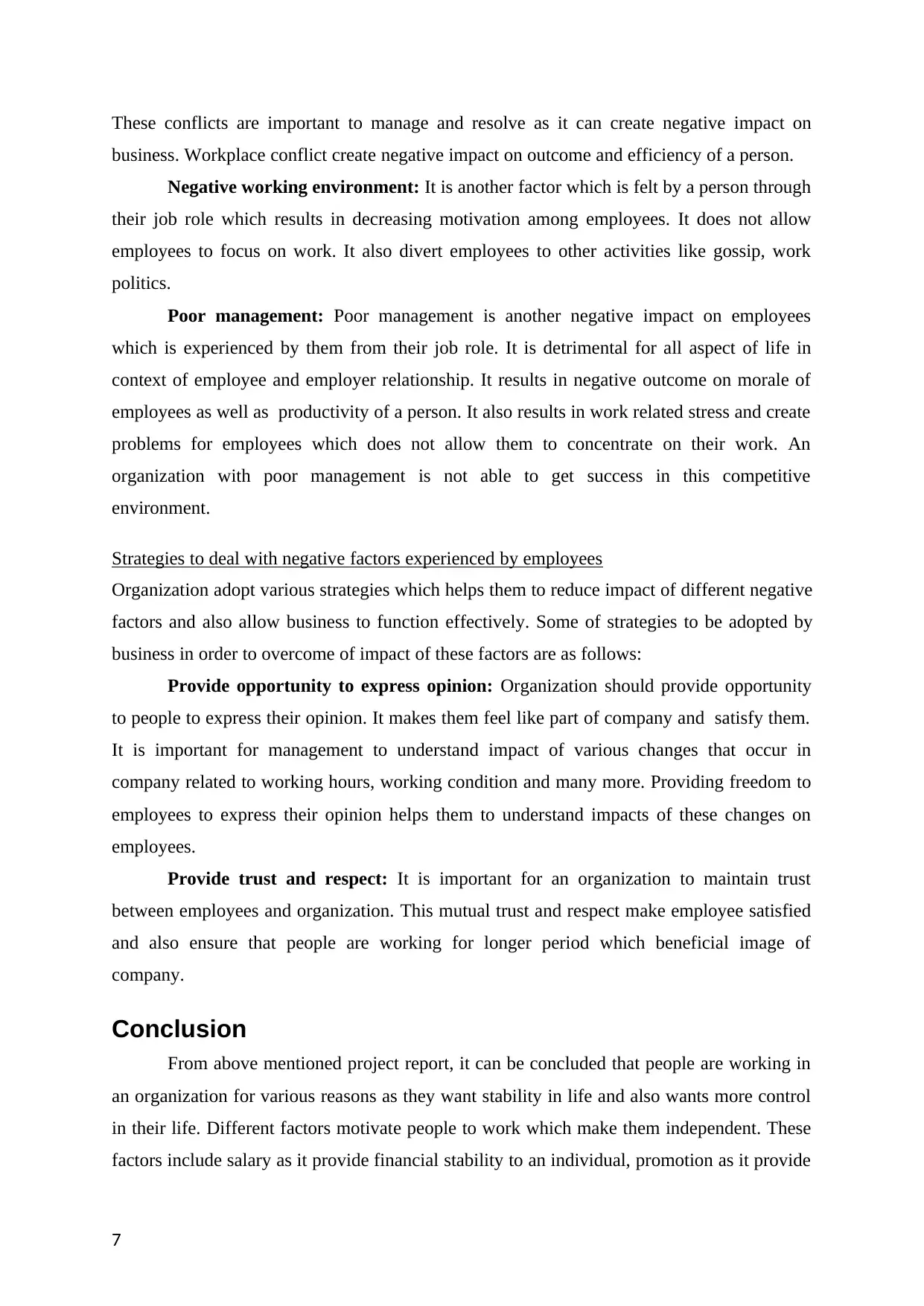
These conflicts are important to manage and resolve as it can create negative impact on
business. Workplace conflict create negative impact on outcome and efficiency of a person.
Negative working environment: It is another factor which is felt by a person through
their job role which results in decreasing motivation among employees. It does not allow
employees to focus on work. It also divert employees to other activities like gossip, work
politics.
Poor management: Poor management is another negative impact on employees
which is experienced by them from their job role. It is detrimental for all aspect of life in
context of employee and employer relationship. It results in negative outcome on morale of
employees as well as productivity of a person. It also results in work related stress and create
problems for employees which does not allow them to concentrate on their work. An
organization with poor management is not able to get success in this competitive
environment.
Strategies to deal with negative factors experienced by employees
Organization adopt various strategies which helps them to reduce impact of different negative
factors and also allow business to function effectively. Some of strategies to be adopted by
business in order to overcome of impact of these factors are as follows:
Provide opportunity to express opinion: Organization should provide opportunity
to people to express their opinion. It makes them feel like part of company and satisfy them.
It is important for management to understand impact of various changes that occur in
company related to working hours, working condition and many more. Providing freedom to
employees to express their opinion helps them to understand impacts of these changes on
employees.
Provide trust and respect: It is important for an organization to maintain trust
between employees and organization. This mutual trust and respect make employee satisfied
and also ensure that people are working for longer period which beneficial image of
company.
Conclusion
From above mentioned project report, it can be concluded that people are working in
an organization for various reasons as they want stability in life and also wants more control
in their life. Different factors motivate people to work which make them independent. These
factors include salary as it provide financial stability to an individual, promotion as it provide
7
business. Workplace conflict create negative impact on outcome and efficiency of a person.
Negative working environment: It is another factor which is felt by a person through
their job role which results in decreasing motivation among employees. It does not allow
employees to focus on work. It also divert employees to other activities like gossip, work
politics.
Poor management: Poor management is another negative impact on employees
which is experienced by them from their job role. It is detrimental for all aspect of life in
context of employee and employer relationship. It results in negative outcome on morale of
employees as well as productivity of a person. It also results in work related stress and create
problems for employees which does not allow them to concentrate on their work. An
organization with poor management is not able to get success in this competitive
environment.
Strategies to deal with negative factors experienced by employees
Organization adopt various strategies which helps them to reduce impact of different negative
factors and also allow business to function effectively. Some of strategies to be adopted by
business in order to overcome of impact of these factors are as follows:
Provide opportunity to express opinion: Organization should provide opportunity
to people to express their opinion. It makes them feel like part of company and satisfy them.
It is important for management to understand impact of various changes that occur in
company related to working hours, working condition and many more. Providing freedom to
employees to express their opinion helps them to understand impacts of these changes on
employees.
Provide trust and respect: It is important for an organization to maintain trust
between employees and organization. This mutual trust and respect make employee satisfied
and also ensure that people are working for longer period which beneficial image of
company.
Conclusion
From above mentioned project report, it can be concluded that people are working in
an organization for various reasons as they want stability in life and also wants more control
in their life. Different factors motivate people to work which make them independent. These
factors include salary as it provide financial stability to an individual, promotion as it provide
7
Paraphrase This Document
Need a fresh take? Get an instant paraphrase of this document with our AI Paraphraser
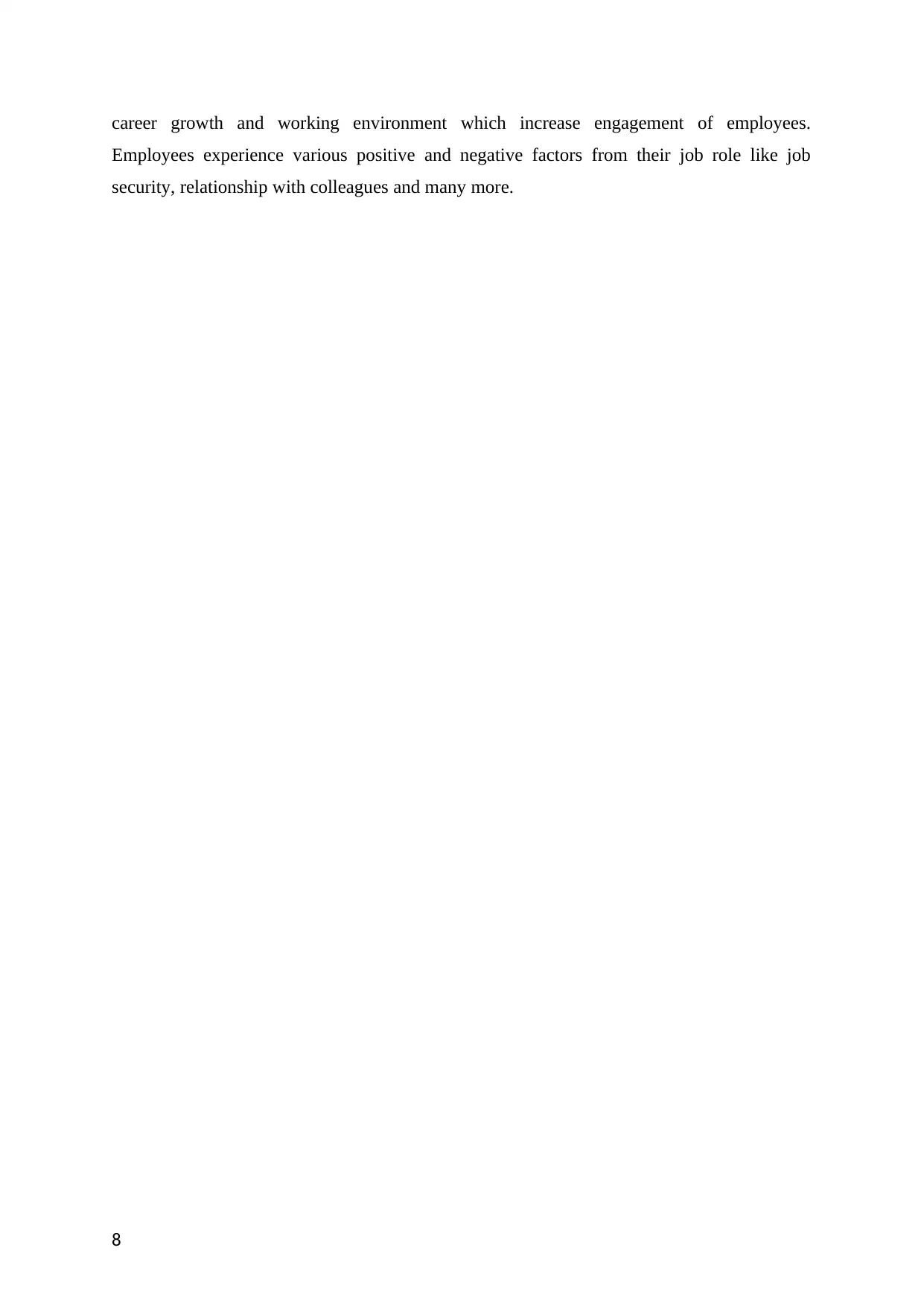
career growth and working environment which increase engagement of employees.
Employees experience various positive and negative factors from their job role like job
security, relationship with colleagues and many more.
8
Employees experience various positive and negative factors from their job role like job
security, relationship with colleagues and many more.
8
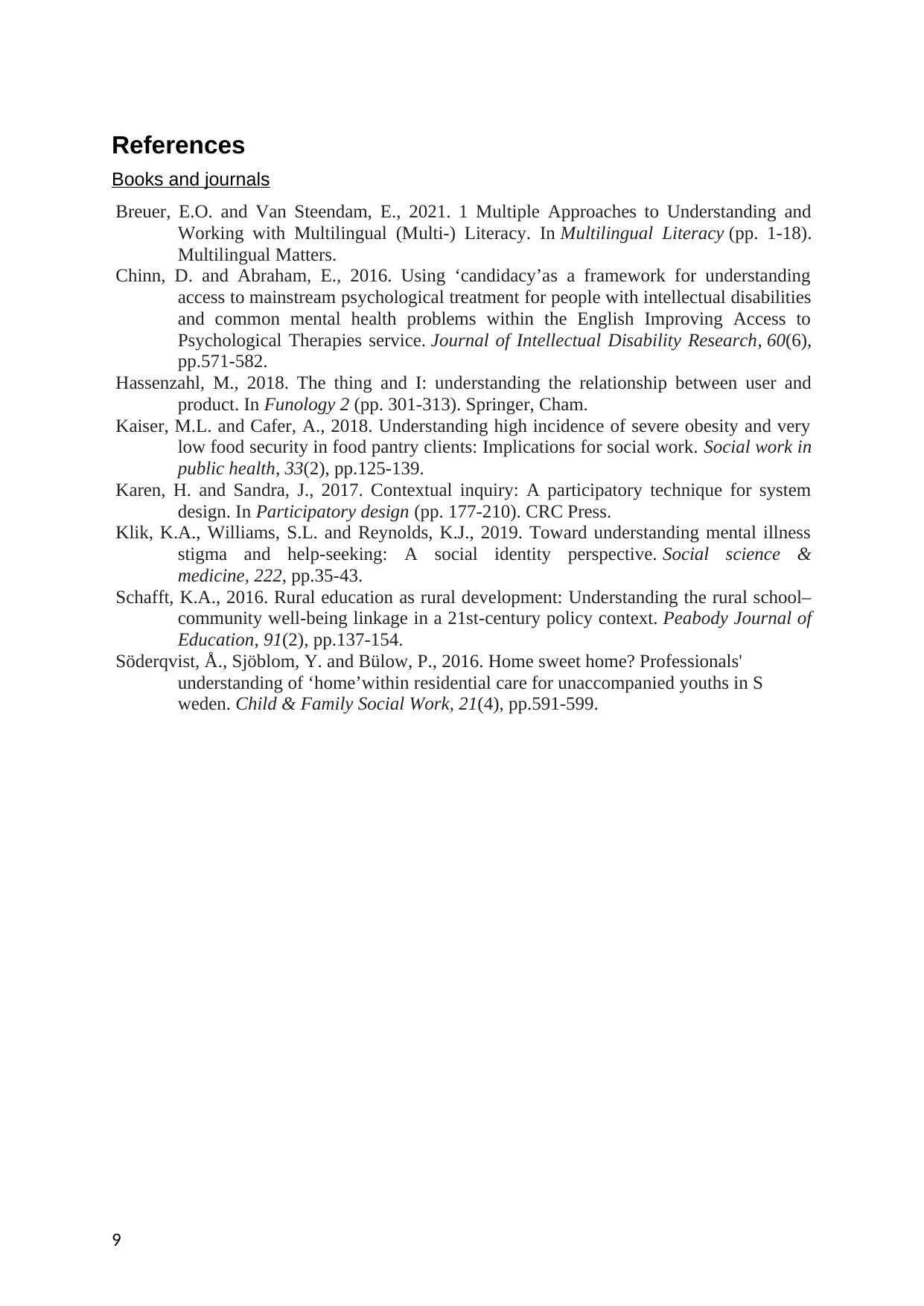
References
Books and journals
Breuer, E.O. and Van Steendam, E., 2021. 1 Multiple Approaches to Understanding and
Working with Multilingual (Multi-) Literacy. In Multilingual Literacy (pp. 1-18).
Multilingual Matters.
Chinn, D. and Abraham, E., 2016. Using ‘candidacy’as a framework for understanding
access to mainstream psychological treatment for people with intellectual disabilities
and common mental health problems within the English Improving Access to
Psychological Therapies service. Journal of Intellectual Disability Research, 60(6),
pp.571-582.
Hassenzahl, M., 2018. The thing and I: understanding the relationship between user and
product. In Funology 2 (pp. 301-313). Springer, Cham.
Kaiser, M.L. and Cafer, A., 2018. Understanding high incidence of severe obesity and very
low food security in food pantry clients: Implications for social work. Social work in
public health, 33(2), pp.125-139.
Karen, H. and Sandra, J., 2017. Contextual inquiry: A participatory technique for system
design. In Participatory design (pp. 177-210). CRC Press.
Klik, K.A., Williams, S.L. and Reynolds, K.J., 2019. Toward understanding mental illness
stigma and help-seeking: A social identity perspective. Social science &
medicine, 222, pp.35-43.
Schafft, K.A., 2016. Rural education as rural development: Understanding the rural school–
community well-being linkage in a 21st-century policy context. Peabody Journal of
Education, 91(2), pp.137-154.
Söderqvist, Å., Sjöblom, Y. and Bülow, P., 2016. Home sweet home? Professionals'
understanding of ‘home’within residential care for unaccompanied youths in S
weden. Child & Family Social Work, 21(4), pp.591-599.
9
Books and journals
Breuer, E.O. and Van Steendam, E., 2021. 1 Multiple Approaches to Understanding and
Working with Multilingual (Multi-) Literacy. In Multilingual Literacy (pp. 1-18).
Multilingual Matters.
Chinn, D. and Abraham, E., 2016. Using ‘candidacy’as a framework for understanding
access to mainstream psychological treatment for people with intellectual disabilities
and common mental health problems within the English Improving Access to
Psychological Therapies service. Journal of Intellectual Disability Research, 60(6),
pp.571-582.
Hassenzahl, M., 2018. The thing and I: understanding the relationship between user and
product. In Funology 2 (pp. 301-313). Springer, Cham.
Kaiser, M.L. and Cafer, A., 2018. Understanding high incidence of severe obesity and very
low food security in food pantry clients: Implications for social work. Social work in
public health, 33(2), pp.125-139.
Karen, H. and Sandra, J., 2017. Contextual inquiry: A participatory technique for system
design. In Participatory design (pp. 177-210). CRC Press.
Klik, K.A., Williams, S.L. and Reynolds, K.J., 2019. Toward understanding mental illness
stigma and help-seeking: A social identity perspective. Social science &
medicine, 222, pp.35-43.
Schafft, K.A., 2016. Rural education as rural development: Understanding the rural school–
community well-being linkage in a 21st-century policy context. Peabody Journal of
Education, 91(2), pp.137-154.
Söderqvist, Å., Sjöblom, Y. and Bülow, P., 2016. Home sweet home? Professionals'
understanding of ‘home’within residential care for unaccompanied youths in S
weden. Child & Family Social Work, 21(4), pp.591-599.
9
⊘ This is a preview!⊘
Do you want full access?
Subscribe today to unlock all pages.

Trusted by 1+ million students worldwide
1 out of 9
Related Documents
Your All-in-One AI-Powered Toolkit for Academic Success.
+13062052269
info@desklib.com
Available 24*7 on WhatsApp / Email
![[object Object]](/_next/static/media/star-bottom.7253800d.svg)
Unlock your academic potential
Copyright © 2020–2026 A2Z Services. All Rights Reserved. Developed and managed by ZUCOL.


